Archbishop of Peć and Serbian Patriarch | |
|---|---|
| Archbishopric | |
| Eastern Orthodox | |
.jpg.webp) | |
| Incumbent: Porfirije since 19 February 2021 | |
| Style | His Holiness |
| Location | |
| Residence | Building of the Patriarchate, Belgrade |
| Information | |
| First holder | Sava (Archbishop) Joanikije II (Patriarch) |
| Established | 1219 (Archbishopric) 1346 and 1920 (Patriarchate) |
| Website | |
| spc | |
This article lists the heads of the Serbian Orthodox Church, since the establishment of the church as an autocephalous archbishopric in 1219 to today's patriarchate. The list includes all the archbishops and patriarchs that led the Serbian Orthodox Church under the Serbian Archbishopric and Serbian Patriarchate of Peć. Today, the church is unified under a patriarch who is officially styled as Archbishop of Peć, Metropolitan of Belgrade and Karlovci, and Serbian Patriarch (Serbian: Архиепископ пећки, митрополит београдско-карловачки, и патријарх српски, romanized: Arhiepiskop pećki, mitropolit beogradsko-karlovački, i patrijarh srpski).
According to the current constitution of the Serbian Orthodox Church, the patriarch is elected by a special convocation of the Bishops' Council,[1] and serves as the chairman of the Holy Synod.[2]
The current patriarch is Porfirije, elected on 18 February 2021.[3] He acceded to this position the next day, following his enthronement in the St. Michael's Cathedral in Belgrade.[4] Porfirije was formally enthroned to the ancient throne of the Serbian patriarchs in the Patriarchal Monastery of Peć on 14 October 2022.[5]
The autocephalous Serbian Archbishopric was founded in 1219 by Sava, under the authority of the ecumenical patriarch of Constantinople. In 1346, when Stefan Dušan proclaimed himself emperor, he also elevated the archiepiscopal see of Peć to the rank of a patriarchate, creating the Serbian Patriarchate of Peć. This was only recognized by the Ecumenical Patriarchate of Constantinople in 1375.
After the Ottoman conquest of the Serbian Despotate in 1459, the patriarchate gradually lost its importance. At times the church was forced by the Ottoman government to install Greeks in the office. From 1766 to 1920 the patriarchate was abolished and all ecclesiastical jurisdiction was given to the patriarch of Constantinople. A metropolitan see was maintained in Belgrade from 1766 afterwards. There were also independent Serbian Orthodox sees based in Karlovci and in Montenegro.
In 1920, the church was reunified and the patriarchy was reestablished with the see moving to Belgrade, but retaining the lineage of the throne of Saint Sava in Peć. The patriarch holds ecclesiastical authority over the Orthodox Church in the territory of the former Yugoslavia, and also over the Serbian Orthodox diaspora in Western Europe, Australia, and the Americas.
Styles
Currently, the style of the head of the Serbian Orthodox Church is "Archbishop of Peć, Metropolitan of Belgrade and Karlovci, and Serbian Patriarch" (архиепископ пећки, митрополит београдско-карловачки и патријарх српски). The short title is "Serbian Patriarch" (патријарх српски). Historically, various styles have been used.
Archbishop Sava (s. 1219–33) was styled "Archbishop of Serb Lands" and "Archbishop of Serb Lands and the Littoral" in the Vranjina charter,[6] while Domentijan (fl. 1253) used the style "Archbishop of all the Serbian and coastal lands" when speaking of Sava.[7] The fresco of Sava at Mileševa calls him "the first Archbishop of All Serb and Diocletian Lands".[8] Archbishop Sava III (s. 1309–16) was styled "Archbishop of All Serb and Littoral Lands".[9]
Legend
| Venerated to sainthood | Also served as Metropolitan of Karlovci | ||
| Also served as Metropolitan of Belgrade | Current Serbian Patriarch | ||
Archbishops, 1219–1346
| Serbian Archbishopric (1219–1346) | |||||
|---|---|---|---|---|---|
| No. | Primate | Portrait | Reign | Notes | |
| 1 | Sava Сава Sabbas |
 |
1219–1233 | First Archbishop of the autocephalous Serbian Church. Seated at Žiča. Styled "Archbishop of Serb Lands and the Littoral". Born at Ras as Rastko Nemanjić / Растко Немањић. | |
| 2 | Arsenije I Арсеније I Arsenius I |
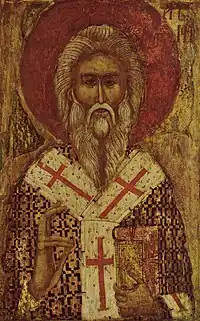 |
1233–1263 | Sava's disciple. Moved the seat to Peć amid foreign invasion.[10] Born in Syrmia. | |
| 3 | Sava II Сава II Sabbas II |
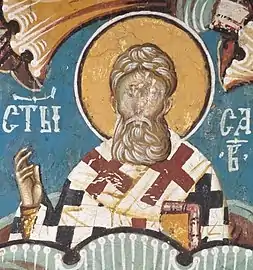 |
1263–1271 | Sava's nephew. Born at Ras as Predislav Nemanjić / Предислав Немањић. | |
| 4 | Danilo I Данило I Daniel I |
 |
1271–1272 | Replaced due to unknown reason.[11] | |
| 5 | Joanikije I Јоаникије I Joannicius I |
 |
1272–1276 | Disciple of Sava II. Buried at Sopoćani. | |
| Seat vacant 1276–1279 | |||||
| 6 | Jevstatije I Јевстатије I Eustathius I |
 |
1279 – 4 January 1286 | Moved the seat to Žiča in 1285.[10] Relics buried at Patriarchate of Peć. Born in Budimlje. | |
| 7 | Jakov Јаков Jacob |
 |
1286–1292 | Moved the seat to Peć in 1291 amid foreign invasion,[10] likely final transfer.[12] | |
| 8 | Jevstatije II Јевстатије II Eustathius II |
 |
1292–1309 | Established seven new eparchies. | |
| 9 | Sava III Сава III Sabbas III |
 |
1309–1316 | Styled "Archbishop of All Serb and Maritime Lands". | |
| 10 | Nikodim I Никодим I Nicodemus I |
 |
1316–1324 | Co-founder of the Vratna monastery. | |
| 11 | Danilo II Данило II Daniel II |
 |
1324–1337 | Hagiographer. | |
| 12 | Joanikije II Јоаникије II Joannicius II |
 |
3 January 1338 – 6 April 1346 | Elevated to Patriarch. Born in Prizren. | |
Patriarchs, 1346–1766
| First Serbian Patriarchate of Peć (1346–1463) | |||||
|---|---|---|---|---|---|
| No. | Primate | Portrait | Reign | Notes | |
| 1 | Joanikije II Јоаникије II Joannicius II |
 |
6 April 1346 – 3 September 1354 | First Patriarch of the Serbian Church. Elevated during the coronation of Emperor Dušan. Seated at Peć. Styled "Archbishop of Peć and Patriarch of all Serb Lands and the Maritime". Born in Prizren. | |
| 2 | Sava IV Сава IV Sabbas IV |
 |
1354–1375 | ||
| 3 | Jefrem I Јефрем I Ephraem I |
 |
3 October 1375 – 1380 | First tenure. | |
| 4 | Spiridon I Спиридон I Spyridon I |
 |
1380 – 11 August 1389 | ||
| (3) | Jefrem I Јефрем I Ephraem I |
 |
1389–1390 | Second tenure. | |
| 5 | Danilo III Данило III Daniel III |
 |
1390–1396 | ||
| 6 | Sava V Сава V Sabbas V |
 |
1396–1406 | ||
| 7 | Danilo IV Данило IV Daniel IV |
 |
1406 | ||
| 8 | Kirilo I Кирило I Cyril I |
 |
1407–1419 | ||
| 9 | Nikon I Никон I Nicon I |
 |
1420–1435 | ||
| 10 | Teofan I Теофан I Theophanes I |
 |
1435–1446 | ||
| 11 | Nikodim II Никодим II Nicodemus II |
 |
1446–1455 | ||
| 12 | Arsenije II Арсеније II Arsenius II |
 |
1457–1463 | ||
| First Ottoman abolishment (1463–1557)[A] | |||||
| See vacant due to Ottoman abolition and transfer of jurisdiction to Archbishopric of Ohrid | |||||
| No. | Primate | Portrait | Reign | Notes | |
| Pavle I Павле I Paul I |
 |
1526–1541 | Styled "Metropolitan of Smederevo". Attempted to restore Serbian Patriarchate on few occasions between 1526 and 1541, succeeding briefly. | ||
| Second Serbian Patriarchate of Peć (1557–1766) | |||||
| No. | Primate | Portrait | Reign | Notes | |
| 13 | Makarije I Макарије I Macarius I |
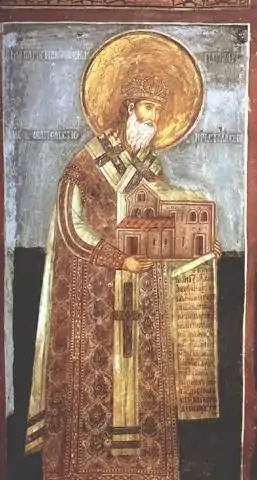 |
1557–1571 | Seated at Peć. Full style "Archbishop of Peć and Patriarch of Serbs and Bulgarians" Basic style "Archbishop of Peć and Serbian Patriarch". Born in Višegrad, surnamed Sokolović (Соколовић). | |
| 14 | Antonije I Антоније I Anthony I |
 |
1571–1575 | Surnamed Sokolović (Соколовић). | |
| 15 | Gerasim I Герасим I Gerasimus I |
 |
1575–1586 | Surnamed Sokolović (Соколовић). | |
| 16 | Savatije I Саватије I Sabbatios I |
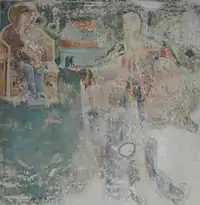 |
1586 | Born in Prijepolje, surnamed Sokolović (Соколовић). | |
| 17 | Nikanor I Никанор I Nicanor I |
 |
1588 | Records lacking | |
| 18 | Jerotej I Јеротеј I Hieroteos I |
 |
1589–1590 | ||
| 19 | Filip I Филип I Philip I |
 |
1591–1592 | ||
| 20 | Jovan II Јован II John II |
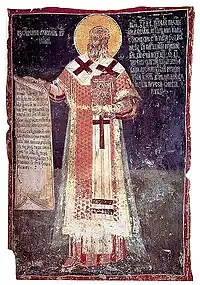 |
1592–1613 | Surnamed Kantul (Кантул). | |
| 21 | Pajsije I Пајсије I Paisius I |
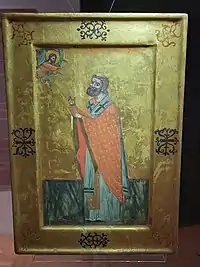 |
1614–1647 | Born in Janjevo. | |
| 22 | Gavrilo I Гаврило I Gabriel I |
 |
1648–1655 | Born in Štitkovo, surnamed Rajić (Рајић). | |
| 23 | Maksim I Максим I Maxim I |
 |
1655–1674 | Born in Skopje. | |
| 24 | Arsenije III Арсеније III Arsenius III |
 |
1674–1690 (1706) | Leader of the First Serbian Migration into the Habsburg monarchy. After 1690, reorganized and headed the branch of the Serbian Church in the Habsburg Monarchy. Born in Cetinje, surnamed Crnojević (Црнојевић). | |
| 25 | Kalinik I Калиник I Callinicus I |
 |
1691–1710 | Ethnic Greek. Maintained the Serbian Patriarchate in turbulent times after the First Serbian Migration from the Ottoman Empire. Born in Skopje. | |
| 26 | Atanasije I Атанасије I Athanasius I |
 |
1711–1712 | ||
| 27 | Mojsije I Мојсије I Moses I |
 |
1712–1725 | Surnamed Rajović (Рајовић). | |
| 28 | Arsenije IV Арсеније IV Arsenius IV |
 |
1725–1737 | Leader of the Second Serbian Migration into the Habsburg monarchy. Born in Peć, surnamed Jovanović Šakabenta (Јовановић Шакабента). | |
| 29 | Joanikije III Јоаникије III Joannicius III |
 |
1739–1746 | Ethnic Greek. Afterwards reigned as Ecumenical Patriarch of Constantinople, from 1761 to 1763. Surnamed Karadža (Караџа). | |
| 30 | Atanasije II Атанасије II Athanasius II |
 |
1746–1752 | Born in Skopje, surnamed Gavrilović (Гавриловић). | |
| 31 | Gavrilo II Гаврило II Gabriel II |
 |
1752 | Born in Sarajevo, surnamed Mihajlović (Михајловић). | |
| 32 | Gavrilo III Гаврило III Gabriel III |
 |
1752–1758 | Bynamed Nikolin (Николин). | |
| 33 | Vikentije I Викентије I Vicentius I |
 |
1758 | Surnamed Stefanović (Стефановић). | |
| 34 | Pajsije II Пајсије II Paisius II |
 |
1758 | Ethnic Greek. | |
| 35 | Gavrilo IV Гаврило IV Gabriel IV |
 |
1758 | Ethnic Greek. | |
| 36 | Kirilo II Кирило II Cyril II |
 |
1758–1763 | ||
| 37 | Vasilije Василије Basil |
 |
1763–1765 | Surnamed Jovanović-Brkić (Јовановић-Бркић). | |
| 38 | Kalinik II Калиник II Callinicus II |
 |
1765–1766 | Ethnic Greek. Resigned as Patriarch, effectively abolishing the post and relegating it to the Ecumenical Patriarch of Constantinople. | |
| Second Ottoman abolishment (1766–1920) | |||||
| After the Ottoman Empire abolished the Serbian Patriarchate of Peć for the second and final time in 1766, the Serbian Orthodox population within the Ottoman Empire was subject to the Ecumenical Patriarchate of Constantinople until 1920. Due to the Great Turkish War between the Ottoman Empire and the Holy League, a large number of Serbs migrated to the Habsburg monarchy in 1690. This caused the establishment of a metropolitanate in Karlovci in 1708. This see was elevated to a patriarchate in 1848, as a reward to Serbs who supported the Habsburgs during the 1848–49 revolutions. After the founding of the Principality of Serbia, the autonomous Metropolitanate of Belgrade was created in 1831, under the Ecumenical Patriarchate of Constantinople. It gained full autocephaly in 1879 and merged in 1920 with the Patriarchate of Karlovci and the Metropolitanate of Montenegro to form the unified Serbian Orthodox Church. | |||||
Patriarchs, 1920–present
| Serbian Patriarchate of Belgrade (Peć) (1920–present) | ||||||
|---|---|---|---|---|---|---|
| No. | Primate | Portrait | Reign | Notes | ||
| 39 | Dimitrije Димитрије Demetrius |
.jpg.webp) |
12 September 1920 | 6 April 1930[13] | 9 years, 6 months and 25 days | First Patriarch of the reunified Serbian Church. Seated at Belgrade. Styled "Archbishop of Peć, Metropolitan of Belgrade and Karlovci, and Serbian Patriarch"[B] Born on 28 October 1846 in Požarevac as Dimitrije Pavlović / Димитрије Павловић. |
| 40 | Varnava Варнава Barnabas |
 |
12 May 1930 | 23 July 1937 | 7 years, 2 months and 11 days | Died under unclear circumstances (possible poisoning). Born on 11 September 1880 in Pljevlja as Petar Rosić / Петар Росић. |
| 41 | Gavrilo V Гaврилo V Gabriel V |
.jpg.webp) |
21 February 1938 | 7 May 1950 | 12 years, 2 months and 16 days | Commonly known as Gavrilo. Born on 17 May 1881 in Vrujci as Gavrilo Dožić / Гaврилo Дoжић. |
| 42 | Vikentije II Викентије II Vicentius II |
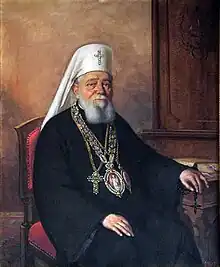 |
1 July 1950 | 5 July 1958 | 8 years and 4 days | Died under unclear circumstances (possible poisoning). Commonly known as Vikentije. Born on 23 August 1890 in Bačko Petrovo Selo as Vitomir Prodanov / Витомир Проданов. |
| 43 | German Герман Herman |
.JPG.webp) |
14 September 1958 | 30 November 1990 | 32 years and 16 days | Longest reigning Patriarch. The only retired Patriarch during his life; died on 27 August 1991. Born on 19 August 1899 in Jošanička Banja as Hranislav Đorić / Хранислав Ђорић. |
| 44 | Pavle Павле Paul |
 |
1 December 1990 | 15 November 2009[14] | 18 years, 11 months and 14 days | Born on 11 September 1914 in Kućanci as Gojko Stojčević / Гојко Стојчевић. |
| 45 | Irinej Иринеј Irenaeus |
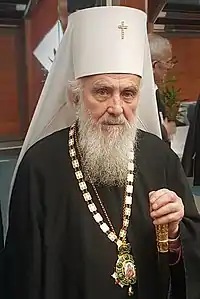 |
23 January 2010[15][16] | 20 November 2020[17] | 10 years, 9 months and 28 days | Born on 28 August 1930 in Vidova as Miroslav Gavrilović / Мирослав Гавриловић. |
| 46 | Porfirije Порфирије Porphyrios |
.jpg.webp) |
19 February 2021[3][4] | Incumbent | 2 years, 10 months and 21 days (as of 9 January 2024) |
Born on 22 July 1961 in Bečej as Prvoslav Perić / Првослав Перић. |
Timeline

See also
- Serbian Orthodox Church
- Patriarchate of Peć (monastery)
- Archbishopric of Belgrade and Karlovci
- Metropolitanate of Belgrade
- Metropolitanate of Karlovci
- Patriarchate of Karlovci
- Metropolitanate of Montenegro and the Littoral
- Greek Catholic Church of Croatia and Serbia
- Religion in Serbia
- Religion in Vojvodina
Annotations
- A The Ottomans did not recognize the official title of "Archbishop of Peć and Serbian Patriarch". However, church records still record these three men as Patriarchs even though they did not serve in full title. They were still known as the guardians or protectors of the "throne of Saint Sava".
- B The patriarchs hold the title of Archbishop of Peć, Metropolitan of Belgrade and Karlovci, and Serbian Patriarch and are considered the successors to the Patriarchal throne of Peć. However, the Patriarchy is based in Belgrade, Serbia.
References
- ↑ Article 43 of the Constitution of 1957.
- ↑ Article 58 of the Constitution of 1957.
- 1 2 "Metropolitan Porfirije of Zagreb and Ljubljana elected for a new Patriarch of Serbia". spc.rs. 18 February 2021. Retrieved 19 February 2021.
- 1 2 "His Holiness Porfirije, Archbishop of Pec, Metropolitan of Belgrade and Karlovci and Serbian Patriarch enthroned". spc.rs. 19 February 2021. Retrieved 19 February 2021.
- ↑ "Serbian Patriarch kyr Porfirije enthroned in the Patriarchate of Peć". spc.rs. 14 October 2022. Retrieved 15 October 2022.
- ↑ Miklosich 1858, pp. 18–19.
- ↑ Radovan Samardžić; Milan Duškov (1993). Serbs in European civilization. Nova. p. 27. ISBN 978-86-7583-015-3.
- ↑ Svetislav Mandić (1986). Velika gospoda sve srpske zemlje i drugi prosopografski prilozi. Srpska književna zadruga. p. 69. ISBN 9788637900122.
- ↑ Miklosich 1858, pp. 76–77, 82–83.
- 1 2 3 Marjanović 2001, p. 73.
- ↑ Slijepčević 2002.
- ↑ Bogdanović 1972, p. 29.
- ↑ "DR. PAVLOVITCH DIES; SERBIAN PATRIARCH; Head of National Church of Yugoslavia Stricken at the Age of 84 Years". The New York Times. 7 April 1930. Retrieved 27 March 2022.
- ↑ "Patriarch Pavle, Serbian Church Leader, Dies at 95". The New York Times. AP. 16 November 2009. Retrieved 15 October 2022.
- ↑ "Bishop of Nis Irinej elected for a new Patriarch of Serbia". spc.rs. 22 January 2010. Retrieved 19 February 2021.
- ↑ "Enthronement of Patriarch Irinej of Serbia". spc.rs. 23 January 2010. Retrieved 14 February 2021.
- ↑ "Serbian Patriarch Irinej reposed in the Lord". spc.rs. 20 November 2020. Retrieved 14 February 2021.
Sources
- Slijepčević, Djoko (1962). Историја Српске православне цркве (History of the Serbian Orthodox Church). Vol. књ. 1. Минхен: Искра.
- Slijepčević, Djoko (1966). Историја Српске православне цркве (History of the Serbian Orthodox Church). Vol. књ. 2. Минхен: Искра.
- Slijepčević, Djoko (1986). Историја Српске православне цркве (History of the Serbian Orthodox Church). Vol. књ. 3. Келн: Искра.
- Slijepčević, Đoko (2002). Istorija srpske pravoslavne crkve: Od pokrštavanja Srba do kraja XVIII veka. Култура. ISBN 978-86-7609-042-6.
- Bogdanović, Dimitrije (1972). Likovi svetitelja (in Serbian). Glavni savez udruženog pravoslavnog sveštenstva SFRJ.
- Dučić, Nićifor (1894). Istorija Srpske pravoslavne crkve od prvijeh desetina VII v. do naših dana (in Serbian). Drž. stamp Kralj. Srbije.
- Marjanović, Čedomir (2001). Istorija Srpske crkve. Ars Libri. ISBN 9788675880011.
- Miklosich, Franz (1858). Monumenta Serbica spectantia historiam Serbiae, Bosnae, Ragusii. Vienna: apud Guilelmum Braumüller.
- Pavlovich, Paul (1989). The History of the Serbian Orthodox Church. Serbian Heritage Books. ISBN 978-0-9691331-2-4.
- Sava, Bishop of Šumadija (1996). Srpski jerarsi: od devetog do dvadesetog veka (in Serbian). Evro.
External links
- Serbian Orthodox Church, history at spc.rs
- Pages on most of the Serbian Patriarchs (in Serbian)
- Kosovo.com: another list of Serbian Patriarchs
- Hierarchical Succession of the Patriarchal See of Serbia from the Orthodox Research Institute
